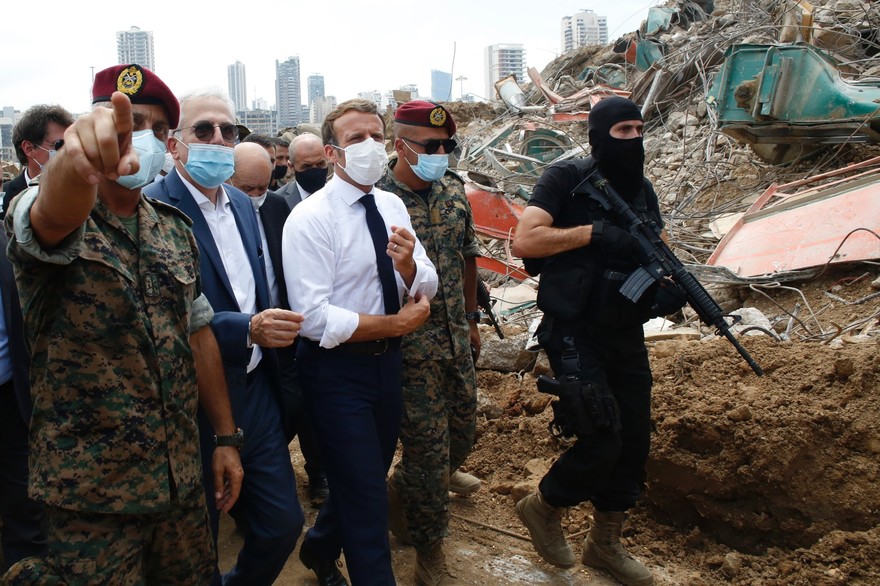Why are French presidents so strongly tied with Lebanon?
Emmanuel Macron was recently in Lebanon, standing at the bedside of Beirut wounded by two explosions. Before him, several French presidents had been there. There is a history of a strong relationship between the two countries.

“Lebanon is not alone.” The comment of Emmanuel Macron was immediate. Right after the double explosion that devastated the port of Beirut and part of the Lebanese capital, the president tweeted his sympathy for the victims and announced France’s help: “France stands by Lebanon. France stands at Lebanon’s side. French aid and resources are on their way there.” Others, like Jean-Yves Le Drian, the Minister of Europe and Foreign Affairs, described Lebanon as “more than a friend, a brother country”.
J’exprime ma solidarité fraternelle avec les Libanais après l’explosion qui a fait tant de victimes et de dégâts ce soir à Beyrouth. La France se tient aux côtés du Liban. Toujours. Des secours et moyens français sont en cours d’acheminement sur place.
— Emmanuel Macron (@EmmanuelMacron) August 4, 2020
Lebanon-France: A historic relationship
In the First World War’s aftermath, the Ottoman Empire was dismembered and several new states were created on its rubble. Among them, Lebanon. In 1920 France received a “mandate” from the League of Nations, the ancestor of the UN. In other words, Lebanon became a protectorate of France, just like Syria. French armies settle in the region. Charles de Gaulle, then commander, lived there between 1929 and 1931.
In 1941, an unfortunate chapter of French history occurred there, as Frenchmen fought against other Frenchmen. During the Second World War, the entire Middle East region was highly coveted. The land of the cedar is no exception. It remains in the hands of the Vichy regime, but the Free France of General de Gaulle intends to claim back this strategic piece of territory. The only way to do so is through the use of force.
The country becomes independent in 1943. Since then, if the relationship has become less close between France and Syria, another protectorate, it is not the same with Lebanon. The ties between the two countries, cultural, political but also human, are still very strong. And a large community lives in France, estimated at over 35,000 people according to the statistical office INSEE.
READ ALSO – France: Scientific Council warns of a second epidemic wave “in autumn or winter”
French presidents at Lebanon’s bedside
Before Emmanuel Macron, who was the first foreign head of state to visit Beirut on Thursday, two days after the explosions that ravaged the city, several French presidents visited Lebanon after attacks or deadly crises.
The first visit by a French president since the country’s independence in 1943, François Mitterrand. He went there on October 23, 1983, within hours of the suicide bombing of the “Drakkar”, the headquarters of the French contingent of the Multinational Force, in which 58 French parachutists died. “In Lebanon, France remains and will remain faithful to its history and its commitments”. The aim of this visit was to pay tribute to the victims and express solidarity with the soldiers of the multinational force.
On February 16, 2005, Jacques Chirac paid a private visit of nearly eight hours to Lebanon to offer his condolences to the family of the former Lebanese Prime Minister, his friend Rafic Hariri, assassinated two days earlier in an explosive attack in the capital.
In June 2008, it was Nicolas Sarkozy’s turn to visit Beirut. There he called on the Lebanese people for reconciliation and dialogue after a political crisis between the anti-Syrian majority supported by Western countries and the opposition led by Hezbollah, which had degenerated into deadly violence in May. Besides a private meeting with President Michel Suleiman, Nicolas Sarkozy also met with leaders of 14 Lebanese parties, including Hezbollah.
The last visit before Macron, in April 2016, François Hollande made a “working visit”. He welcomed the “exceptional solidarity” of the Lebanese towards the Syrian refugees who have fled the bloody conflict in their country since 2011. He visits a Syrian refugee camp and pledges “€100 million over the next three years” to help Lebanon cope with the influx of refugees.